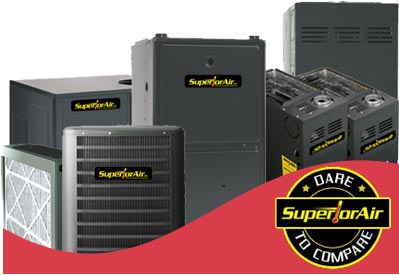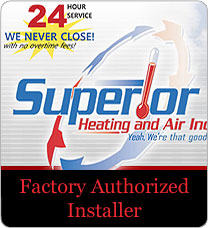Repair vs replace
Most likely, if you are reading this document, the central heating and cooling system in your home is not functioning properly. With the help and support of Superior Air, you are preparing to make the decision whether it’s best to repair or replace the old heating and/or cooling system.
This guide was created to assist you with this decision. Regardless of your final choice, we believe that you will want your home’s heating and cooling system to deliver the optimum combination of energy-saving and money-saving efficiency, indoor comfort, and years and years of reliable service. While it’s easy to believe that the costs associated with repairing your current system might be less than the cost of purchasing a new heating and cooling system, you need to calculate all the associated costs. To help you determine the costs to heat and cool your home, visit www.energystar.gov.
Repairing an old, inefficient system may not allow you the opportunity to enjoy the benefits of lowering your energy bill with a new, more efficient system; spending less money to keep your home comfortable, and taking advantage of the exceptional limited warranty coverage offered on Superior Air products. And, should you decide to purchase a new system, your Superior Air dealer has several financing programs that can be tailored to your budget.
Regardless of your final decision, when you have a Superior Air heating and cooling system, you are a member of the millions and millions of homeowners,who agree, “Superior Air really is “where your comfort zone comes first!” especially when it comes to refreshingly affordable home comfort.








Regardless of your final decision, when you have a Superior Air heating and cooling system, you are a member of the millions and millions of homeowners,who agree, “Superior Air really is “where your comfort zone comes first!” especially when it comes to refreshingly affordable home comfort.
EFFICIENCY RATINGS
SEER
SEER or Seasonal Energy Efficiency Ratio ratings are established by the U. S. Department of Energy (DOE). Currently the lowest SEER rating for central air conditioners is 13. The rating was increased from 10 SEER to 13 SEER in January 2006. The higher the rating number the more efficiently the unit operates.
SEER & HSPF
The rating system for a heat pump’s cooling efficiency is the same as residential central air conditioners – SEER. A heat pump’s heating mode efficiency rating is defined by its HSPF (Heating Seasonal Performance Factor) rating. This measurement is determined by The U.S. Department of Energy (DOE). It is wise to compare both the SEER and HSPF ratings when you are purchasing a heat pump product. Depending on the geographical location of your home, you may place more emphasis on a heat pump’s ability to either heat or cool the indoor space of your home. For example, homes in the sunbelt may need more cooling capacity and those built in colder climates may require stronger heating performance.
AFUE
AFUE or Annual Fuel Utilization Efficiency ratings are set by the American Society of Heating, Refrigeration and Air Conditioning Engineers or ASHRAE. Currently the lowest AFUE rating that manufacturers can produce is 80%. The higher the AFUE rating, the greater its potential energy savings.For example, a Superior Air brand gas furnace with an AFUE rating of 96% indicates that for every $1.00 of energy used to operate the furnace only four cents is not fully utilized.
Air Conditioning Refrigerants
Two types of refrigerant are widely used in air conditioning and heat pump systems: R-22 and R-410A. The United States agreed to provisions in the 1987 Montreal Protocol and instituted the Clean Air Act Amendments of 1990. This law prescribes the phase out of ozone-depleting chemicals, including one used by the air conditioning industry. Since R-410A refrigerant does not contain chlorine, it is commonly referred to as the environmentally friendly refrigerant, compared to R-22 refrigerant which contains chlorine.
Warranty Coverage
Regardless of the energy efficiency rating, all functional parts on Superior Air brand Air Conditioners, Heat Pumps and Gas Furnaces are covered by a minimum 10-Year Parts Limited Warranty.*In addition, several Superior Air brand models go beyond the 10-years for a total of 12- years parts warranty and also include 12-Year Labor coverage to replace those parts. Several Superior Air brand Air Conditioner and Heat Pump models are backed by a Lifetime Compressor Limited Warranty.* This means that if the compressor ever fails to the original, registered homeowner, a new compressor will be provided at no charge for as long as they own their home.(installation costs will apply after the 12th year) Most Superior Air brand Gas Furnace models also feature a Lifetime Heat Exchanger Limited Warranty.* Should the heat exchanger ever fail to the original registered homeowner, a new heat exchanger will be provided at no charge for as long as they own their home.(installation costs will apply after the 12th year) Beyond this coverage, several Superior Air brand models are backed with a 10-Year Unit Replacement Limited Warranty.* Should the compressor or heat exchanger fail to the original, registered homeowner in the first decade of use, a new unit will be provided at no charge.






